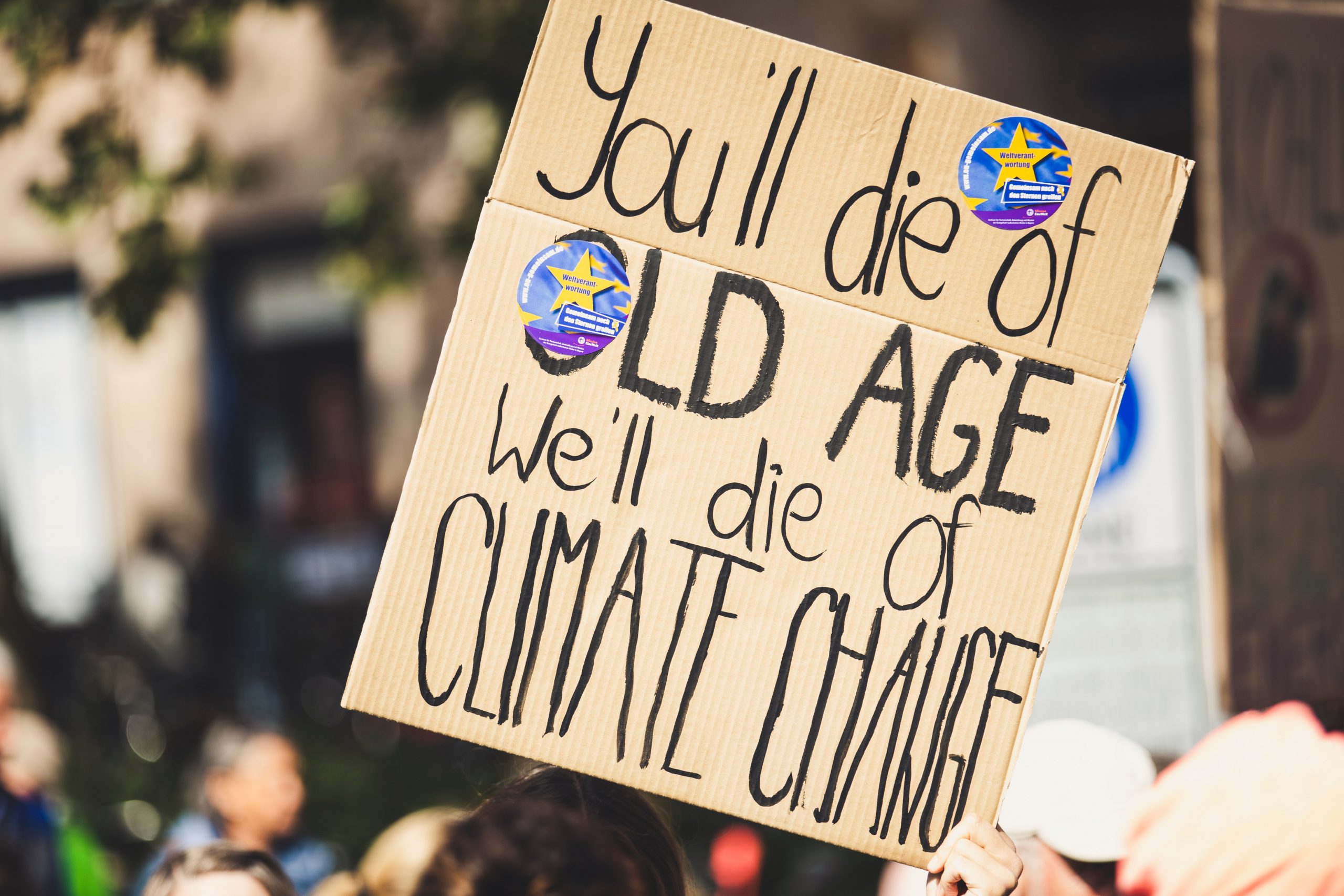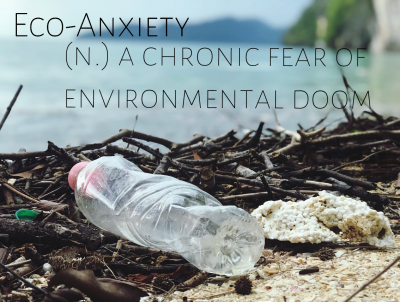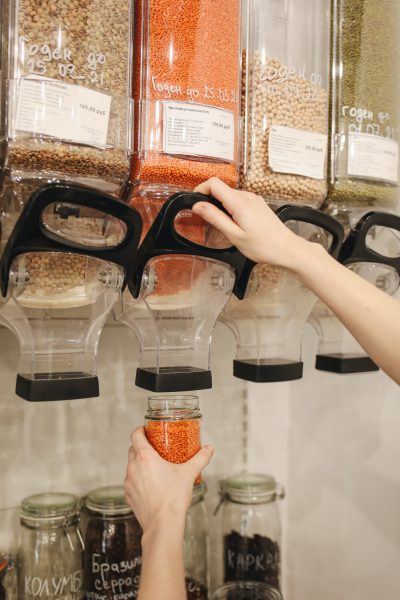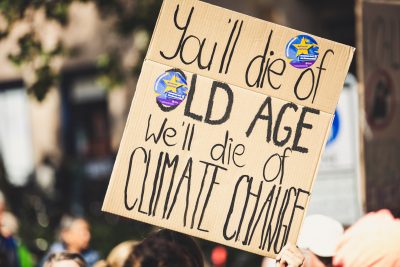
Eco-Anxiety: The Roadblock to Sustainability
If I am to be perfectly candid here, I have never had a vested interest in sustainability. I didn’t avoid it – my plastics go in the recycle bin, I separate my coffee cup and lid before throwing them away, and my masks are all cloth. But, all of these are actions are to my benefit anyway – the recycle bin is right next to the waste bin, I’ll look like a good person if I separate my lid and cup, and cloth masks are just way more comfortable.

Photo by sigmund on Unsplash
The truth is, I tended to avoid discussions of sustainability. In between the reducing, reusing and recycling was an underlying sense of doom, a pervasive hopelessness that makes my blood run cold, my stomach sink to my toes and my limbs turn to lead. I’ve tried to be environmentally conscious, truly, but anytime I do I’m hit with an overwhelming wave of grief and terror for the future of our time bomb of a planet.
I struggle with eco-anxiety and eco-depression, and I know I’m not the only one. Researchers have long documented the effects of climate change on our mental health, noting sleep disorders, anxiety, depression, posttraumatic stress disorder and suicidal ideation as psychological side effects of the climate crisis. Whilst such emotional responses can trigger pro-environmental actions, sparked by a need to avoid and take control of the situation, they can also act as a roadblock, provoking apathy and hopelessness – I, unfortunately, fall into the latter. And, up until pretty recently, I was content in my little bubble of ‘chronic fear of environmental doom’.

Eco-anxiety | photo Catherine Sheila | edited Sharna Limb
It was only when tasked with writing my blog post here that I really began introspection into what my grievances with sustainability were, and it was only then I could start to overcome them. And so, today, I take you through this writer’s journey to acceptance and action in the wake of apathy and depression.
The 5 Stages of Grief
As a child of the 90s, my entire life has been marred by panic and discomfort at the thought of my future on this planet. I’ve been forced to make plans for a future that I don’t think I will have, denying the truth in favour of my perfect future with my dream job and family. I’ve been angry, frustrated at governments who refuse to take charge, and I’ve pleaded with friends and family to vote Greens, sent out my silent prayers that Jeff Bezos and Elon Musk will have a sudden change of heart. And, most recently, I’ve felt hopeless, doomed to spectate the mass extinction of our planet. I’ve been grieving, processing the immense loss of my future, my life, my planet, and even humanity itself. It’s grief on the biggest scale I can imagine, but it’s still grief.
Which means it’s time to move on to acceptance. My grief is normal, and it’s actually common; given that the Australian Psychological Society has an entire handbook dedicated to this, I know I’m not alone. There is undeniably a huge loss involved with climate change and coming to terms with this is the first step to overcoming it. And for me, personally, this has manifested through acknowledging that this sense of loss means that there is something I want to protect.
I write this at the onset of Spring in Brisbane city – fluffy, new ducklings are figuring out how to jump up curbs, Jacaranda petals line the streets I walk, and I can’t help but smile at how much I cherish these small acts of nature. I want to take action, not only for myself, but for all the ducklings I may get to see along that way.

Photo by Harufumi Haga, 2021. Used with permission, artist retains all rights to this image.
Self-Gratification and Naïve Optimism
So, now I have a why, but what about a how to take action? In my clouded mind, majority of everyday acts of sustainability appeared to come from a place of self-gratification, a desire to scream ‘Look at me! I’m helping! Look how great I am!’ and not only receive validation from peers, but also satisfy the need to do something, even if it is a proverbial drop in the ocean of what needs to be done. On top of this, the assertion that one’s small act of recycling could possibly save the world was, in my mind, naïve at best and delusional at worst.

Photo by Polina Tankilevitch from Pexels
Truth be told, I still think everyday acts come from a place of self-gratification and optimism – but this isn’t a bad thing. Acknowledging and allowing yourself the small victories, of one less plastic bottle in the ocean, one less ride in the car, and one tampon into land fill, are instrumental to not falling back into the grief cycle. It’s a coping strategy, a method of alleviating feelings of helplessness and working towards making habits and rituals which make positive change.
On top of this, research indicates that actively discussing and promoting what we’re doing to create change is instrumental to creating wider social change – the more we discuss it, model positive behaviours and normalise our tiny acts of sustainability, the more people will be inclined to follow. Being blatantly optimistic and open about what we’re doing to enact change prods others into joining the movement, places increasing pressure on governments to enact change, and pushes towards collective action.
If Greta Thunberg Can’t Save the World, How Can I?
When I’m not suffering from existential despair or writing think pieces, I’m a university student; a cashier at Coles; a fan of musical theatre; a lover of cats (cat tax here). I am, most certainly, not an activist. I lack the dedication, tenacity, and passion of Greta Thunberg, without even a hint of her charisma or talent for public speaking. My point is, I’m not a hero – I can’t save the world.

Photo by Markus Spiske from Pexels
Greta Thunberg can’t save the world either. She can shout and push and demand but, at the end of the day, she is just one person. Everyone on the planet is just one person, and whilst some may be able to drop $10 billion USD (or more) towards climate change, it would be foolish to sit back and hope they take charge. However, it’s the actions of many ones that can push towards change. I can’t save the world, but me, and you, and your friends, and Greta Thunberg and all the people she’s touched – together, maybe we can.
It would be remiss of me not to acknowledge how overly trite the idea of ‘together we can change the world’ is. Yet, even to my cynic soul, there is something truly empowering and inspiring about knowing you’re apart of a community, a movement, and that your actions matter. On top of this, given that sustainability is a worldwide problem, it follows that it requires a worldwide solution, no matter how tired the platitude may be.
Research documents the necessity to take collective action towards climate change; on an individual level, we simply cannot do enough to make the changes necessary, no matter how sustainably we live. As such, it falls to shifts in societal values, attitudes, and beliefs to make real change, and working together is the first step towards this. Collective action like nonviolent protests and advocacy and education not only force outsiders to the collective to stop and consider their actions, but forces governments and huge polluters to take accountability and enact change.
A Conclusion, of Sorts
So, here I am. Pessimist turned activist. I won’t lie to you and say I’m suddenly the pinnacle of sustainability, sitting atop my zero-waste throne. But, I am proud of where I am and where I’ve come from. Eco-anxiety and eco-depression amongst young people are well documented and verified, and yet discussion of them in mainstream media wanes in favour of celebrating the increasing reliance on teenagers to undertake the gargantuan task of saving the world. Mainstream media needs to do more to address and acknowledge eco-anxiety, and support people struggling to overcome it and make the jump towards sustainable practices.
Sustainability is a complex, ongoing, and enormous issue to face, and implementation is not easy. It is only by facilitating and elevating conversations surrounding all aspects of it – including reservations and fears – that we can truly take strides towards a better future.
References
American Psychological Association (2017). Mental Health and Our Changing Climate: Impacts, Implications and Guidance. Retrieved from https://www.apa.org/news/press/releases/2017/03/mental-health-climate.pdf
Australian Psychological Society (2017). The Climate Change Empowerment Handbook. Retrieved from https://psychology.org.au/getmedia/88ee1716-2604-44ce-b87a-ca0408dfaa12/climate-change-empowerment-handbook.pdf
Bergan, B. (2021, February 19). Can Elon Musk, Bill Gates, or Jeff Bezos Really Save Humanity? Interesting Engineering. Retrieved from https://interestingengineering.com/elon-musk-bill-gates-jeff-bezos-save-humanity
Hickman, C. (2020). We need to (find a way to) talk about … Eco-anxiety. Journal of Social Work Practice, 34(4), 411–424. https://doi.org/10.1080/02650533.2020.1844166
Legg, T. J. (2019). What to know about eco-anxiety. Medical News Today. Retrieved from https://www.medicalnewstoday.com/articles/327354
Rees, J. H., & Bamberg, S. (2014). Climate protection needs societal change: Determinants of intention to participate in collective climate action. European Journal of Social Psychology, 44(5), 466–473. https://doi.org/10.1002/ejsp.2032
Stanley, S., Hogg, T., Leviston, Z. & Walker, I. (2021). From anger to action: Differential impacts of eco-anxiety, eco-depression, and eco-anger on climate action and wellbeing. The Journal of Climate Change and Health, 1, 100003.
